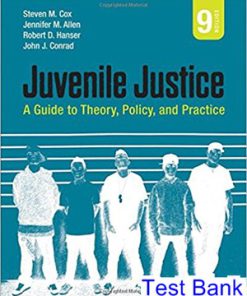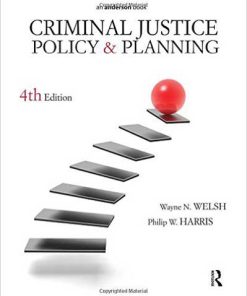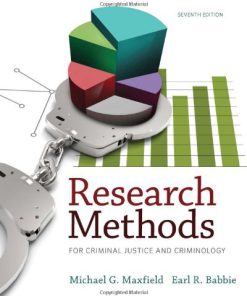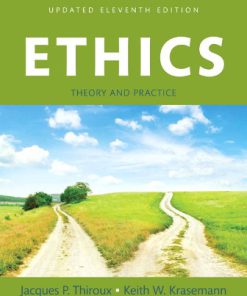Criminal Justice Ethics Theory and Practice 4th Edition Banks Test Bank
$35.00 Original price was: $35.00.$26.50Current price is: $26.50.
Criminal Justice Ethics Theory and Practice 4th Edition Banks Test Bank
Criminal Justice Ethics Theory and Practice 4th Edition Banks Test Bank
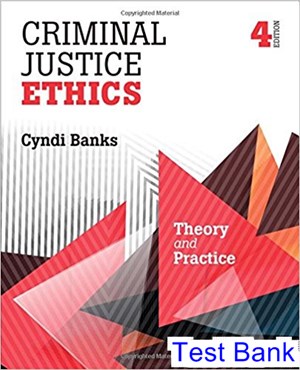
Product details:
- ISBN-10 : 1506326056
- ISBN-13 : 978-1506326054
- Author: Cyndi Banks
Criminal Justice Ethics, Fourth Edition examines the criminal justice system through an ethical lens by identifying ethical issues in practice and theory, exploring ethical dilemmas, and offering suggestions for resolving ethical issues and dilemmas faced by criminal justice professionals. Bestselling author Cyndi Banks draws readers into a unique discussion of ethical issues by exploring moral dilemmas faced by professionals in the criminal justice system before examining the major theoretical foundations of ethics. This distinct organization allows readers to understand real life ethical issues before grappling with philosophical approaches to the resolution of those issues.
Table contents:
| Part I | The Interaction Between Ethics and the Criminal Justice System | 1 |
| 1. | The Importance of Ethics in Criminal Justice | 3 |
| The Meaning of Ethics | 3 | |
| The Value of Ethics | 3 | |
| Normative Ethics | 7 | |
| Ethical Relativism | 7 | |
| Cultural Relativsm | 7 | |
| Ethical Absolutism | 8 | |
| Ethical Pluralism | 9 | |
| Religion and Ethical Standards | 10 | |
| Conduct Is Right Because God Commands It | 10 | |
| God Commands Right Conduct Because It Is Right | 11 | |
| Ethics and Natural Law | 11 | |
| Ethics and Law | 11 | |
| Ethical Dilemmas | 12 | |
| Ethical Issues in Criminal Justice | 15 | |
| Summary | 16 | |
| Discussion Questions | 17 | |
| 2. | Ethics and the Police | 19 |
| Ethics and Policing | 19 | |
| The Nature of Policing | 20 | |
| Police as an Institution | 21 | |
| Police Culture | 21 | |
| Police Discretion | 25 | |
| Ethics and Codes of Ethics | 26 | |
| Police Use of Force | 29 | |
| Dirty Harry/Dirty Hands | 33 | |
| Police Corruption | 34 | |
| Conditions Contributing to Police Corruption | 35 | |
| Drugs and Corruption | 37 | |
| “Slippery Slope” | 38 | |
| Consequences of Corruption | 38 | |
| Combating Corruption | 38 | |
| Whistle-Blowing | 39 | |
| Discrimination as Corruption | 41 | |
| Ethical Issues in Investigation, Interrogation, and Custody | 45 | |
| Rights of Suspects | 45 | |
| Privacy | 46 | |
| Entrapment | 46 | |
| Deception | 47 | |
| Lying | 49 | |
| Explanations for Police Corruption | 50 | |
| Summary | 52 | |
| Discussion Questions | 52 | |
| 3. | Racial Discrimination in the Criminal Justice System | 57 |
| Ethical Background | 57 | |
| Historical Context | 58 | |
| Is There Racial Discrimination in the Criminal Justice System? | 59 | |
| Police Encounters With Citizens and Police Arrest | 61 | |
| Bail | 61 | |
| Jury Selection | 61 | |
| Conviction and Sentencing | 64 | |
| Imprisonment Disparities | 66 | |
| Death Penalty Disparities | 67 | |
| Hate Crimes | 67 | |
| Explanations for Racial Discrimination in the Criminal Justice System | 68 | |
| Summary | 72 | |
| Discussion Questions | 72 | |
| 4. | Lawyers and Ethics | 77 |
| Legal Ethics: Historical Context | 77 | |
| The Nature of Professional Ethics | 79 | |
| The Principle of Partisanship | 79 | |
| The Principle of Neutrality | 79 | |
| The Lawyer-Client Relationship | 81 | |
| Confidentiality | 82 | |
| Client Perjury | 82 | |
| Client Crime | 83 | |
| Defense Lawyers | 84 | |
| 1. | Is It Ethically Proper to Represent a Client Accused of a Criminal Offense When the Lawyer Knows the Client Is Guilty? | 85 |
| 2. | Is It Ethically Proper to Cross-Examine a Witness With the Aim of Discrediting His or Her Credibility or Reliability When the Lawyer Knows the Witness Is Telling the Truth? | 86 |
| 3. | Is It Ethically Proper to Have a Witness Give Testimony When the Lawyer Knows That the Witness Will Commit Perjury? | 87 |
| The Prosecutor | 88 | |
| The Duty to Ensure Justice Is Done | 88 | |
| Discretion to Bring Charges | 89 | |
| Prosecution Disclosure of Evidence to the Defense | 91 | |
| Plea Negotiations | 91 | |
| Prosecutorial Misconduct | 93 | |
| Judicial Ethics | 96 | |
| Ethical Rules Governing Judges | 98 | |
| Summary | 99 | |
| Discussion Questions | 99 | |
| 5. | The Purpose of Criminal Punishment | 103 |
| What Is Punishment? | 103 | |
| Theoretical Approaches to Punishment | 104 | |
| Why Punish? The Philosophical Approach | 105 | |
| Deterrence | 106 | |
| Retribution | 109 | |
| Just Deserts | 113 | |
| Reconciling Utilitarian and Retributive Theories | 115 | |
| Rehabilitation | 116 | |
| Incapacitation | 117 | |
| Restorative Justice | 118 | |
| Why Punish? The Sociological Approach | 120 | |
| Summary | 123 | |
| Discussion Questions | 124 | |
| 6. | Ethics in Corrections | 127 |
| The Prison Explosion | 127 | |
| Maximum Security Conditions | 128 | |
| Women’s Incarceration | 130 | |
| Medium Security | 130 | |
| Minimum Security | 130 | |
| Stateville Prison: The Changing State of Corrections | 131 | |
| Guarding Ethically | 134 | |
| The Experience of Guarding | 137 | |
| Corruption of Authority | 138 | |
| Power and Authority in Prison: Controlling the Inmates | 139 | |
| The Battle for Compliance | 140 | |
| Evaluating Guards | 141 | |
| Rewards and Punishments | 141 | |
| Enforcing Rule Violations | 142 | |
| Informal Controls | 143 | |
| Guarding With Discretion | 144 | |
| The Gray Wall of Silence: Prison Guard Subculture | 145 | |
| Subculture and Socialization | 145 | |
| Guard Types | 148 | |
| Use of Force | 149 | |
| The Court’s View of Correctional Officer Use of Force | 155 | |
| Correctional Policy on the Use of Force | 156 | |
| Prisoner “Power” | 156 | |
| Unethical Situations | 157 | |
| Rape in Prison | 157 | |
| Corruption | 158 | |
| Whistle-Blowing in Corrections | 161 | |
| Ethical Considerations in Probation and Parole | 162 | |
| Arming Probation Officers | 164 | |
| Treatment or Control? | 165 | |
| Parole | 165 | |
| Summary | 166 | |
| Discussion Questions | 167 | |
| 7. | The Ethics of Criminal Justice Policy Making | 171 |
| The Ethics of Policy Making | 171 | |
| Morality Policy | 174 | |
| Public Opinion About Punishment | 176 | |
| Mandatory Minimum Sentencing | 178 | |
| The “War on Drugs” | 181 | |
| Truth in Sentencing | 182 | |
| Predators and Superpredators | 183 | |
| Sexual Predators | 183 | |
| Superpredators | 185 | |
| Capital Punishment | 186 | |
| Public Opinion on Capital Punishment | 188 | |
| Private Prisons | 192 | |
| Summary | 196 | |
| Discussion Questions | 198 | |
| Part II | The Application of Ethical Theories to the Criminal Justice System | 203 |
| 8. | Duty and Principle | 209 |
| Hypothetical and Categorical Imperatives | 210 | |
| The Principle of Universality | 210 | |
| Respect for All Persons | 212 | |
| Kingdom of Ends | 213 | |
| Conflicts of Duties Between Rules | 214 | |
| Applying Deontological Theory: A Case Study | 215 | |
| Summary | 218 | |
| Discussion Questions | 219 | |
| 9. | Considering the Consequences | 221 |
| Pleasure and Happiness | 223 | |
| Act Consequentialism | 223 | |
| Rule Consequentialism | 224 | |
| Public Policy and Utilitarianism | 224 | |
| Arguments Criticizing Utilitarianism | 225 | |
| Applying Utilitarian Theory: A Case Study | 229 | |
| Summary | 233 | |
| Discussion Questions | 234 | |
| 10. | The Importance of Character | 235 |
| Virtues | 237 | |
| Aristotle and Happiness | 239 | |
| The Golden Mean | 240 | |
| Practical Wisdom | 240 | |
| What’s Wrong With Virtue | 241 | |
| Applying Virtue Theory: A Case Study | 245 | |
| Summary | 248 | |
| Discussion Questions | 249 | |
| 11. | Egoism, Pleasure, and Indifference | 251 |
| Stoicism | 251 | |
| Hedonism | 253 | |
| Ethical Egoism | 254 | |
| Applying the Theory of Ethical Egoism: A Case Study | 256 | |
| Summary | 259 | |
| Discussion Questions | 260 | |
| 12. | A Sense of Justice | 261 |
| Application of the Principles | 262 | |
| Justice as Fairness | 264 | |
| Moral Development | 264 | |
| Applying Rawlsian Theory | 265 | |
| Summary | 267 | |
| Discussion Questions | 268 | |
| 13. | Caring for Others | 269 |
| Kohlberg and Gilligan | 269 | |
| A Theory of Moral Development | 270 | |
| “In a Different Voice”: Carol Gilligan | 270 | |
| Gender and the Ethic of Care | 272 | |
| An Ethic of Care | 274 | |
| Developing the Ethic of Care | 275 | |
| The Ethic of Care and Justice | 277 | |
| Peacemaking | 278 | |
| Applying the Ethic of Care: A Case Study | 280 | |
| Summary | 284 | |
| Discussion Questions | 285 | |
| Index | 287 | |
| About the Author | 307 |
People also search:
criminal justice ethics theory and practice 4th edition pdf
what is ethics in criminal justice
ethical theories in criminal justice
ethics in criminal justice examples
You may also like…
Test Bank
Basics of Research Methods for Criminal Justice and Criminology 4th Edition Maxfield Test Bank
Test Bank
Fundamentals of Research in Criminology and Criminal Justice 4th Edition Bachman Test Bank
Test Bank
Test Bank for Ethics: Theory and Practice, Updated Edition, 11th Edition, Jacques P. Thiroux




